Development Dynamics
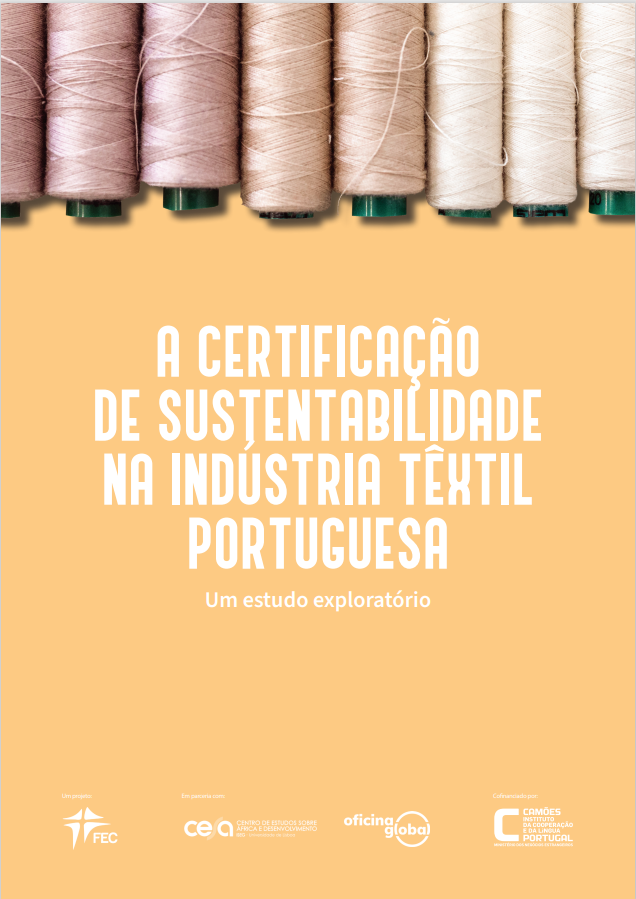
A certificação de sustentabilidade na Indústria Têxtil Portuguesa: um estudo exploratório
Abstract:
This study analyzes sustainability certification in the Portuguese textile industry. The main objective is to map the current landscape of sustainable practices adopted by this crucial sector of the Portuguese economy, evaluating the implications, challenges, and benefits of certification in the contemporary economic and environmental context. We aim to understand how sustainability certifications can serve as a strategic tool to boost the competitiveness of Portuguese companies in the global market, responding to the growing demand for ethical and environmentally conscious products.
The methodology employed in this study involves a review of the existing literature on sustainability in the textile industry. Essentially, it is a hybrid and comparative analysis, utilizing the complete universe of certified Portuguese textile companies. While this focused approach does not answer all questions, it allows this study to take a small step towards research committed to supporting companies that, despite clear risks and costs, choose to invest in sustainability. It also addresses the societal pressure that can and should be exerted on legislators to implement stronger regulatory frameworks and on companies that decide not to invest in sustainability.
This is a small step we hope will lead to further research efforts. We offer a perspective on the role of sustainability certification as a competitive differentiator for the Portuguese textile industry. The study emphasizes the growing importance of sustainability as a selection criterion for consumers and international business partners, reinforcing the need for Portuguese companies to continue investing in sustainable practices and obtaining certifications that validate their efforts. The study also presents and discusses recommendations for future policies and strategies, aiming to strengthen Portugal’s position as a leader in sustainable textile production on the global stage.
Cite this ebook:
Bernardo, Luís Pais (2024). A certificação de sustentabilidade na Indústria Têxtil Portuguesa : um estudo exploratório. Lisboa: Oficina Global.

Algodão, uma fibra global
Abstract:
Cotton doesn’t lie. This well-known idiom in Portugal highlights how the most important natural fiber — both historically and commercially — has woven itself into our lives. Yet, while cotton doesn’t deceive, it does conceal. It’s more than just a fiber; it’s an entire global industry. It shapes production and consumption patterns, directly impacting the lives of millions worldwide. Cotton influences the fate of soils and water sources and significantly affects the environment. It encompasses agriculture, fashion, and high technology. Cotton has a complex and often troubling history: it can be sweet, but it’s also bitter. Its soft touch belies the complexity of its life cycle, which spans from cotton fields in Burkina Faso to garment factories in Bangladesh, fashion runways in Milan, and algorithms in New York. This distribution isn’t arbitrary: the value gap —evident in the income disparity between a field worker in Burkina Faso, a factory manager in Bangladesh, and a top designer in Milan — illustrates global inequalities. Cotton connects these diverse landscapes and activities. This briefing is for anyone who wants to understand the fashion they wear and the fibers they choose. It’s also for decision-makers regulating cotton production and consumption. Responsible consumption is a key step in altering economic structures, but it’s rarely enough on its own. Our aim is clear: meaningful action requires clarity, knowledge, and information.
Cite this ebook:
Bernardo, Luís Pais (2023). Algodão, uma fibra global. Lisboa: FEC | Fundação Fé e Cooperação.
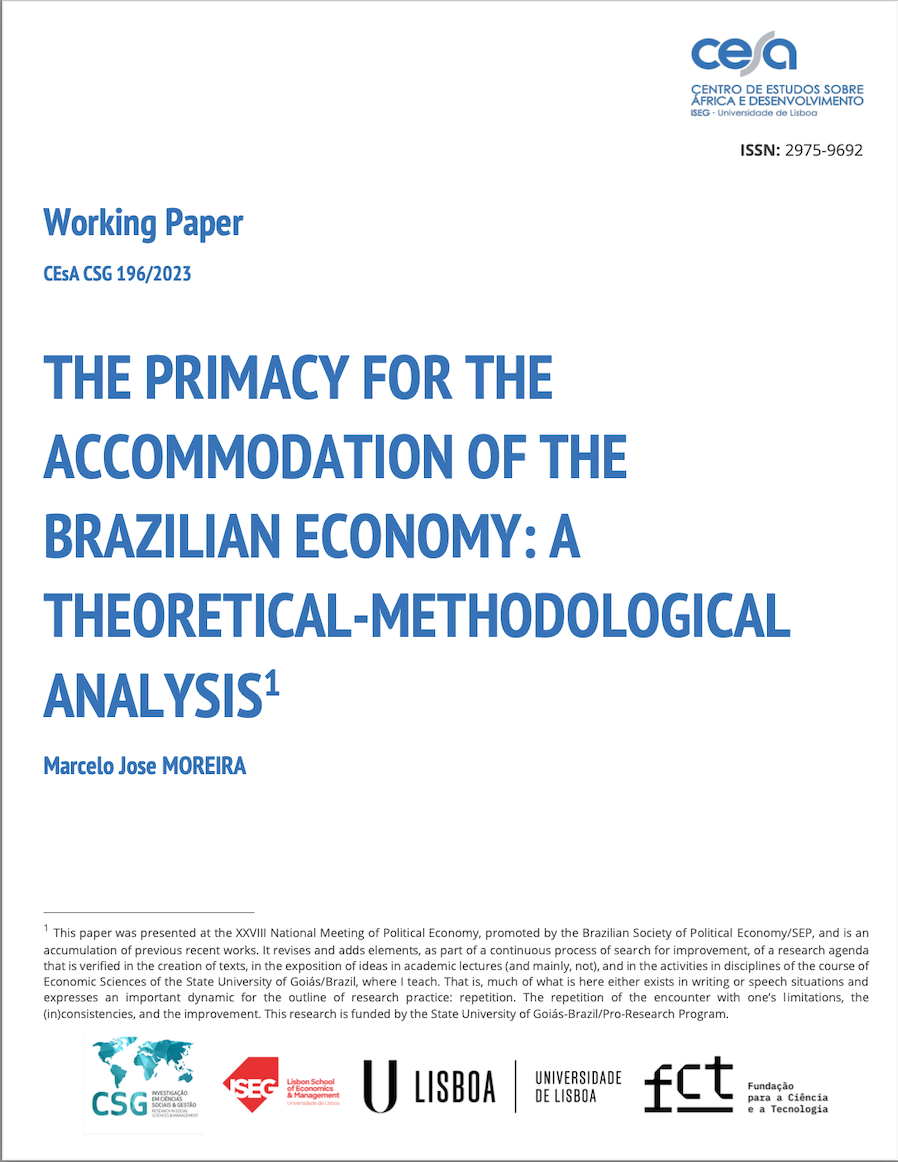
Working Paper 196/2023: The Primacy for the Accommodation of the Brazilian Economy: A Theoretical-Methodological Analysis
Abstract:
The capitalist economy is immersed in generalized inertia. A movement of slow accumulation, low investment, limited growth rates, but with a high level of profit, and which is due to intense pressure on the levels of existing inequalities, combining worldwide restructuring of the generation of wealth and income to a pattern of reproduction of the labor force at the level of its limited maintenance. This inertia occurs, above all, from the financial-productive crisis of the first decade of the 2000s. Brazil is no stranger to this inertia and its developments. Therefore, this paper intends, from a conceptual reflection, to analyze the national economic conjuncture, from what I call the structure and primacy for the accommodation of the Brazilian economy.
Cite this Working Paper:
Moreira, Marcelo Jose (2023). “The Primacy for the Accommodation of the Brazilian Economy: A Theoretical-Methodological Analysis”. CEsA/CGS – Documentos de trabalho nº 196/2023
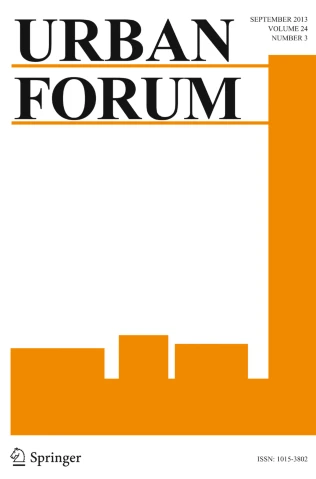
Armed Conflict and Urbanization in Cabo Delgado, Mozambique: A methodology for a critical inquiry
Abstract:
Mainstream urban theory fails to encompass urbanization in Africa. Among its many drivers, armed conflicts displace rural populations to cities, accelerating urban processes and impacting sustainability and governance — the phenomenon of conflict-induced urbanization. In the province of Cabo Delgado, a violent insurgency has been displacing thousands of civilians since 2017; many of whom have fled to the provincial capital Pemba, doubling its population in just 5 years. This article presents the theoretical framework and methodological design for an inquiry located within a contemporary critique of mainstream urban studies; the goal is to analyse conflict-induced urbanization in Pemba with a comparative case study, using participatory visual methods, for which a pilot study took place in September 2022. With this, the author aims to contribute to engaged urban studies in Mozambique and Portugal and to transform the trauma of war into opportunities for sustainable development and prosperity.
Cite this article:
Agostinho do Amaral, S. Armed Conflict and Urbanization in Cabo Delgado, Mozambique: A Methodology for a Critical Inquiry. Urban Forum (2023). https://doi.org/10.1007/s12132-023-09505-y
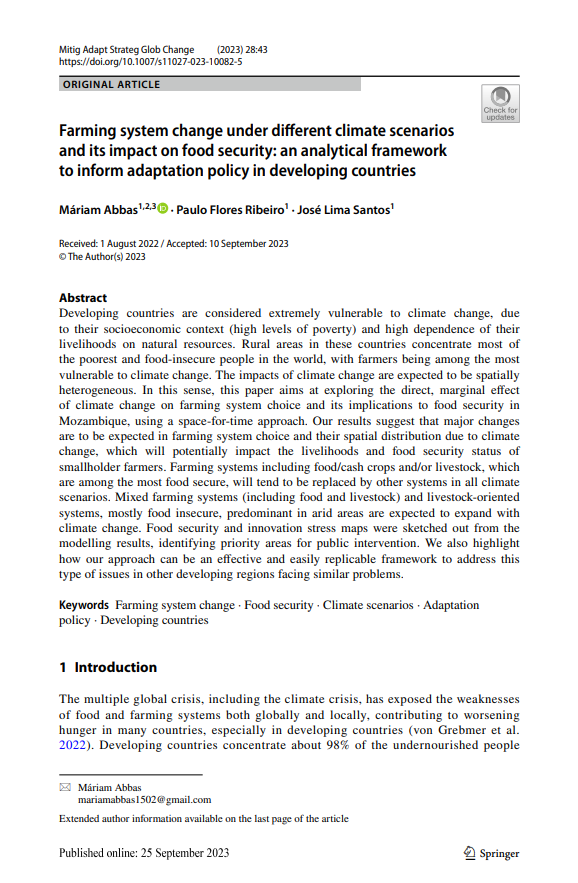
Farming System Change Under Different Climate Scenarios and its Impact on Food Security: an analytical framework to inform adaptation policy in developing countries
Abstract:
Developing countries are considered extremely vulnerable to climate change, due to their socioeconomic context (high levels of poverty) and high dependence of their livelihoods on natural resources. Rural areas in these countries concentrate most of the poorest and food-insecure people in the world, with farmers being among the most vulnerable to climate change. The impacts of climate change are expected to be spatially heterogeneous. In this sense, this paper aims at exploring the direct, marginal effect of climate change on farming system choice and its implications to food security in Mozambique, using a space-for-time approach. Our results suggest that major changes are to be expected in farming system choice and their spatial distribution due to climate change, which will potentially impact the livelihoods and food security status of smallholder farmers. Farming systems including food/cash crops and/or livestock, which are among the most food secure, will tend to be replaced by other systems in all climate scenarios. Mixed farming systems (including food and livestock) and livestock-oriented systems, mostly food insecure, predominant in arid areas are expected to expand with climate change. Food security and innovation stress maps were sketched out from the modelling results, identifying priority areas for public intervention. We also highlight how our approach can be an effective and easily replicable framework to address this type of issues in other developing regions facing similar problems.
Quotation:
Abbas, M., Ribeiro, P.F. & Santos, J.L. Farming System Change Under Different Climate Scenarios and its Impact on Food Security: an analytical framework to inform adaptation policy in developing countries. Mitig Adapt Strateg Glob Change 28, 43 (2023). https://doi.org/10.1007/s11027-023-10082-5
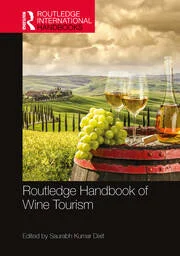
Exploring Co-creation Process in the Wineries: The relevance of social partner characteristics
Abstract:
In a global market, the exchange is regarded as one of the most important strategic resources that are critical for business company success (Hammervoll 2012; Johnson 1999; Powers and Reagan 2007). Hence, it is not a surprise that producers, distributors, retailers, customers, and even competitors join forces to co-create value solutions. With the business environment becoming more competitive, a dyadic perspective of buyer–seller relations is increasing. Partners should be concerned about joining forces and working together to improve their joint performance and add value to their offers (Cannon et al. 2010). In sum, the success of a company can be influenced by the style of the relationship that is developed with other players (Arranz and de Arroyabe 2012; Cunha, Loureiro, and Rego 2015a; Monteiro, Guerreiro and Loureiro 2019; Terpend and Ashenbaum 2012). Following this appeal for research, this chapter aims to explore how distributors and wine producers describe the personal and organizational social capabilities as facilitating facets of relationship quality (RQ) (it is an issue that depends on confidence, satisfaction, commitment, and trust). The wine sector is selected as a field of research because it has unique features which have not yet been deeply studied and could explain management specificities: 1 Portugal is an old wine country full of tradition and heritage, ‘in which the wine culture has been flourishing for centuries’ (Loureiro and Kaufmann 2012, p. 331). 2 The wine sector has not been deeply analyzed and studied in previous research. 3 This sector plays an important role in the national economy, and the recognition of the quality of the work carried out in this sector is being acclaimed internationally. This chapter is organized as follows: after this introduction of our topic research, we present the theoretical background that supported this study, followed by a description of the methodology. The following sections discuss research findings from the empirical study, and the implications for managers of this study are discussed. Finally, limitations and new research directions are suggested.
Quotation:
Sarmento, E. M, Loureiro, S. M. C., and Cunha, N. Exploring Co-creation Process in the Wineries: The relevance of social partner characteristics. In: Dixit, S.K. (Ed.). (2022). Routledge Handbook of Wine Tourism. Routledge. https://doi.org/10.4324/9781003143628
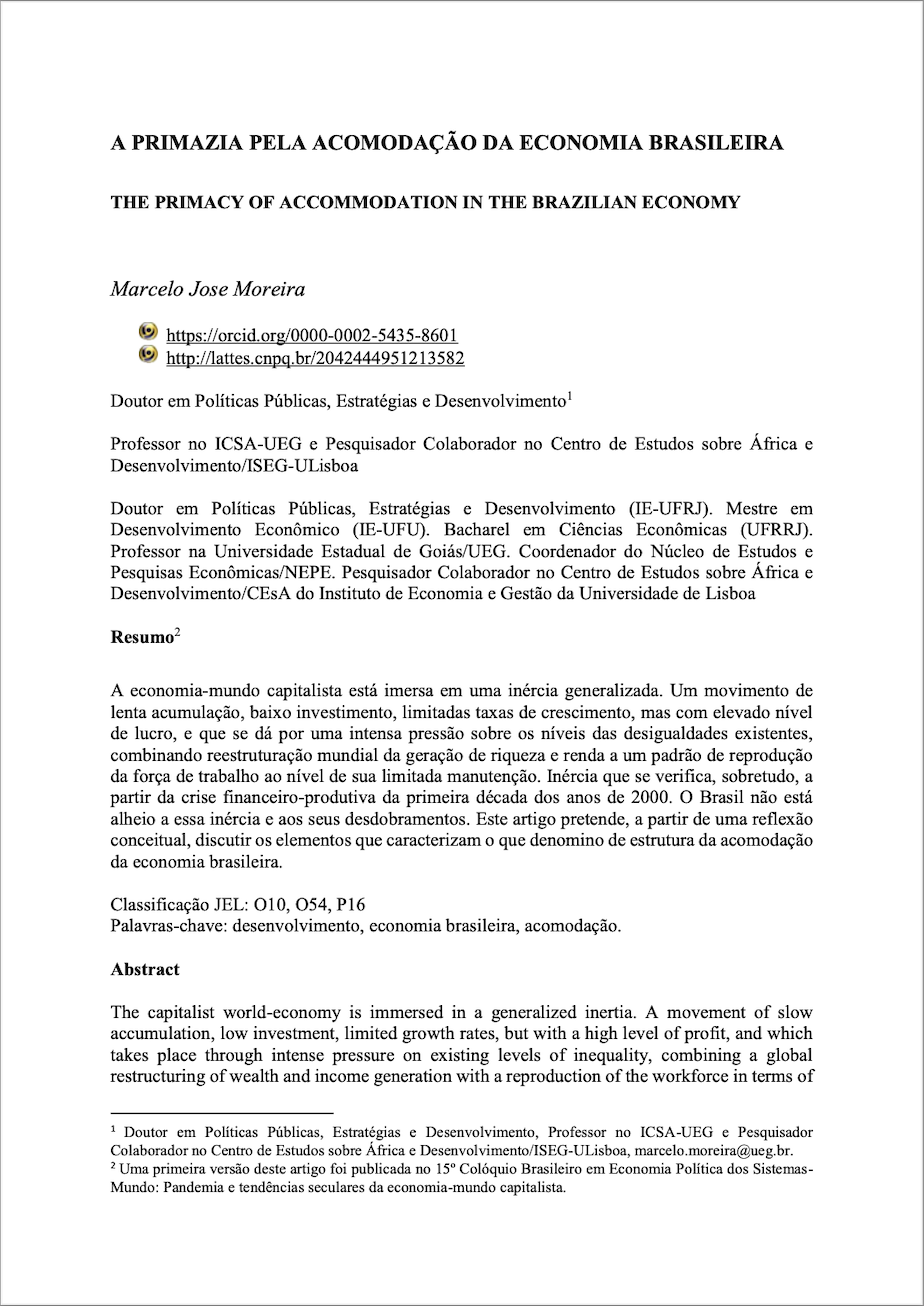
The primacy of accommodation in the Brazilian economy
Abstract:
The capitalist world-economy is immersed in a generalized inertia. A movement of slow accumulation, low investment, limited growth rates, but with a high level of profit, and which takes place through intense pressure on existing levels of inequality, combining a global restructuring of wealth and income generation with a reproduction of the workforce in terms of its limited maintenance. Inertia that can be seen, mainly, from the productive-financial crisis of the first decade of the 2000s. Brazil is not oblivious to this inertia and its consequences. This article intends, from a conceptual reflection, to discuss the elements that characterize what I call the accommodation structure of the Brazilian economy.
Quotation:
Moreira, Marcelo José (2021). “A primazia pela acomodação da economia brasileira”. Revista de Economia da UEG. 17(2), p. 44-65
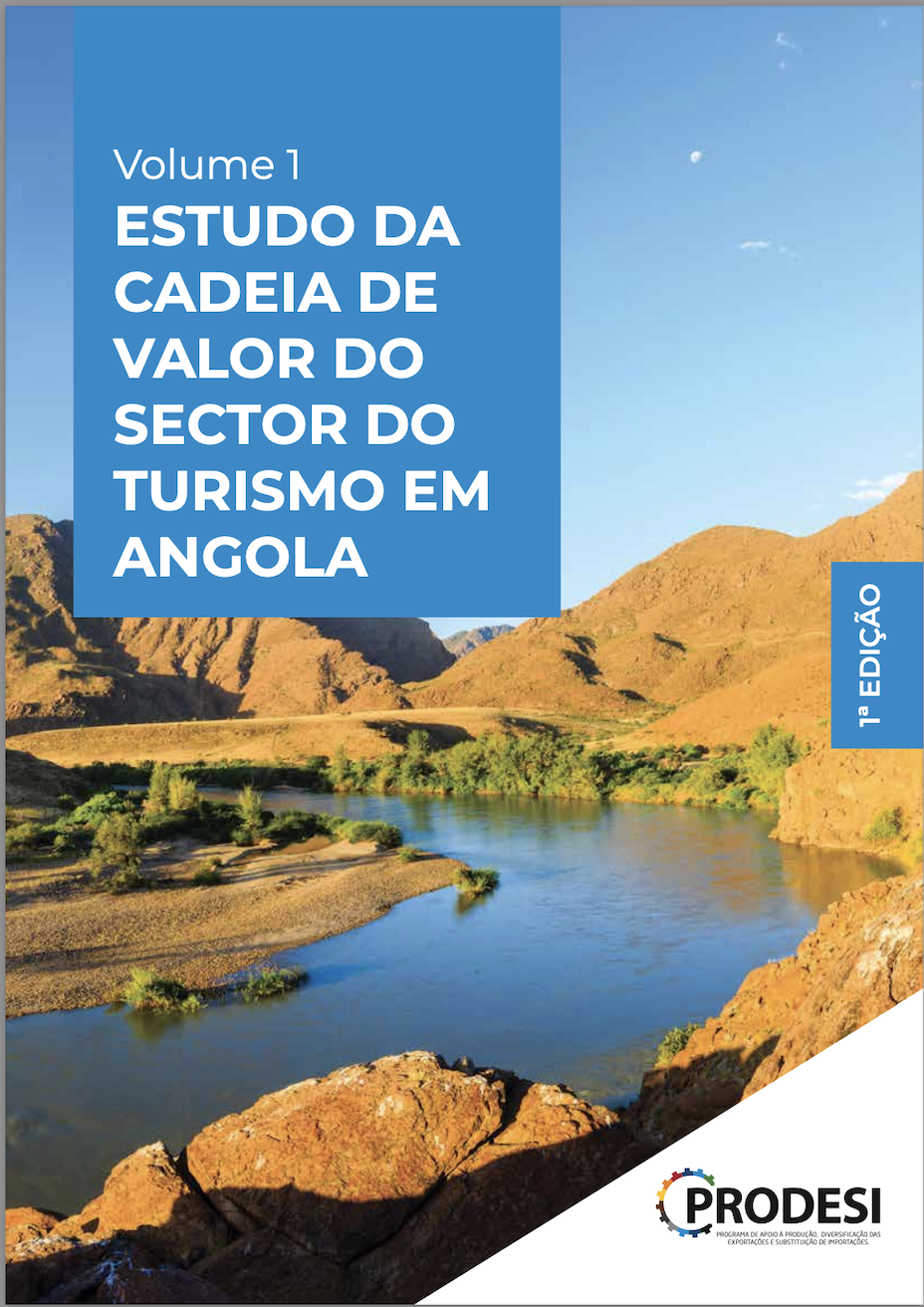
Estudo da cadeia de valor do setor do turismo em Angola – 1ª Edição
Abstract:
Tourism has grown steadily at an international level, both in terms of the number of tourists and in terms of revenue generated. However, Angola has not followed this trend, so it is not surprising that the weight of tourism in the country’s GDP is reduced (less than 1% in 2018). This situation is all the more serious as the countries in the region all have a much higher contribution from tourism to the GDP than Angola. The aim of this report is to identify the main weaknesses of the value chain that underpins tourism activity and to propose a set of measures and recommendations to be implemented within the scope of PRODESI.
Quotation:
Sarmento, Eduardo Moraes e PAHL Consulting (2020). Estudo da cadeia de valor do sector do turismo em Angola. Volume 1. Banco Africano de Desenvolvimento e Ministério da Economia e do Planeamento.
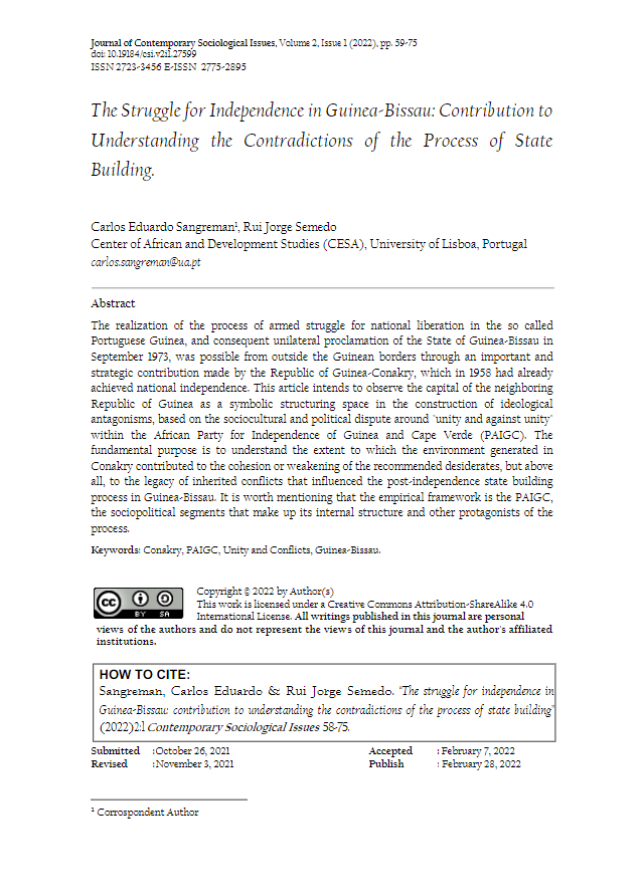
The Struggle for Independence in Guinea-Bissau – Contribution to Understanding the Contradictions of the Process of State Building
Abstract:
The realization of the process of armed struggle for national liberation in the so called Portuguese Guinea, and consequent unilateral proclamation of the State of Guinea-Bissau in September 1973, was possible from outside the Guinean borders through an important and strategic contribution made by the Republic of Guinea-Conakry, which in 1958 had already achieved national independence. This article intends to observe the capital of the neighboring Republic of Guinea as a symbolic structuring space in the construction of ideological antagonisms, based on the sociocultural and political dispute around “unity and against unity” within the African Party for Independence of Guinea and Cape Verde (PAIGC). The fundamental purpose isto understand the extent to which the environment generated in Conakry contributed to the cohesion or weakening of the recommended desiderates, but above all,to the legacy of inherited conflicts that influenced thepost-independence state building processin Guinea-Bissau. It is worth mentioning thatthe empirical framework is the PAIGC, the sociopolitical segments that make up its internal structure and other protagonists of the process.
Quotation:
SANGREMAN, Carlos Eduardo; SEMEDO, Rui Jorge. The Struggle for Independence in Guinea-Bissau. Journal of Contemporary Sociological Issues, [S.l.], v. 2, n. 1, p. 59-75, feb. 2022. ISSN 2775-2895. Available at: <https://jurnal.unej.ac.id/index.php/JCSI/article/view/27599>. Date accessed: 04 may 2023. doi: https://doi.org/10.19184/csi.v2i1.27599.
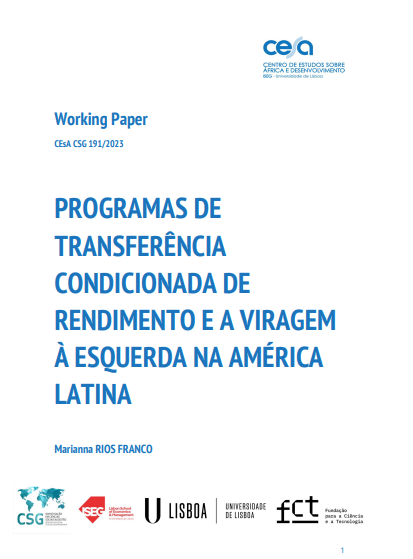
Working Paper 191/2023: Programas de transferência condicionada de rendimento e a viragem à esquerda na América Latina
Abstract:
In the last three decades, two phenomena have emerged and expanded in waves in Latin America: Conditional Cash Transfer (CCT) programs and the arrival of left-wing governments to power. This scenario is set in a historic period of economic recovery in the Region, especially with the “commodity boom”, providing the resources and political space needed to govern on the left and promote social policies. Transferência condicionada de rendimento e a viragem à esquerda na América Latina works with the research hypothesis that left-wing governments were the ones that most created, supported and expanded this type of public policy in Latin America in the period 2000-2020. Thirthy-two CCTs were mapped, implemented by 18 countries in the Region, as well as their presidents and policy guidelines. In addition to reporting on the evolution of the implementation of these policies, this work carried out a quantitative analysis based on IDB and ECLAC databases about the beginning and end of these programs, as well as the evolution of the coverage of beneficiaries. The main conclusions indicate that the hypothesis is only partially and limitedly confirmed. In short, left-wing governments achieved the highest numbers in absolute terms regarding the creation and expansion of CCTs in the region, but centrist governments achieved the highest rates of new programs and increased coverage (in relative terms) – with subtle differences in outcomes between left-wing and centrist governments. Thus, we conclude that the adoption and expansion of CCTs among Latin American countries in the last two decades was largely independent of the political orientation of the governments considered. It was, above all, a regional stake that crossed ideologies, historical moments and economic crises to redistribute income over the last 20 years to more than 100 million people.
Quotation:
Rios Franco, M. (2023). “Programas de transferência condicionada de rendimento e a viragem à esquerda na América Latina“. Instituto Superior de Economia e Gestão – CEsA/CSG – Documentos de Trabalho nº 191/2023





